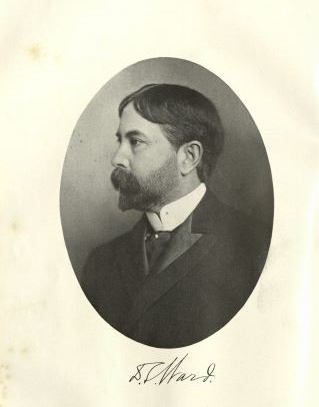
David Livingston Ward served on the East Carolina board of trustees for a brief but turbulent time, from 1918-1921, one witnessing the end of WWI, the entirety of the 1918 pandemic, the victory of the women’s suffrage movement, and the final years of East Carolina’s training school era (1909-1921). In addition to serving on the ECTTS board, Ward, a prominent figure in Democratic Party politics, also served on the gubernatorial staffs of Govs. Robert Broadnax Glenn (1854-1920) and William Walton Kitchin (1866-1924), and as superior court judge for North Carolina’s third judicial district.
Born in Greene County, Ward was raised in Wilson and educated at Wake Forest College (then located north of Raleigh). After completing his undergraduate degree, he earned his law license at Dick and Dillard School of Law in Greensboro. Ward then moved to San Francisco to practice with a large California legal firm.
In 1890, Ward returned to eastern North Carolina and established a law office in New Bern. He soon became active in Craven County Democratic politics and in 1900 served as part of the County Convention supporting the proposed slate of candidates for election that year. Ward made the motion, backed unanimously, that Craven County Democrats support, for governor, Charles B. Aycock (1859-1912), noting explicitly Aycock’s “untiring efforts in behalf of White Supremacy and Good Government.” Ward also proposed support for F. M. Simmons (1854-1940) for the U.S. Senate, noting Simmons’ “great and patriotic service to the State in bringing about white supremacy.” Ward furthermore called for Craven County’s support for the so-called literacy amendment which he said would secure for “the people of North Carolina for all time to come the blessings of good government and white government … and bring about permanent peace and harmony between the white race and the negro and promote the peace, happiness, and prosperity of the State by the elimination of the ignorant negro voter.” Ward’s motion passed unanimously. While part of the early twentieth century progressive movement in North Carolina, Ward and his brand of progressivism clearly failed to transcend the limits of the racial bigotry institutionalized statewide during the Jim Crow period.
Sources:
-
“Author of Prohibition Act is Dead.” Daily Times-News (Burlington). January 16, 1932. P. 6.
-
“County Convention.” New Berne Weekly Journal. March 27, 1900. P. 4.
-
“D. L. Ward Dies at Home in New Bern – Former Superior Court Judge Succumbs to Sudden Heart Attack.” News and Observer. January 15, 1932. P. 1.
-
“General Assembly of 1905: David L. Ward.” News and Observer. March 19, 1905. P. 10.
-
“State Senator D. L. Ward.” New Berne Weekly Journal. June 26, 1906. P. 2.
-
“To Hold Memorial for Judge D. L. Ward.” News and Observer. February 4, 1932. P. 10.
Citation Information
Title: David Livingston Ward
Author: John A. Tucker, PhD
Date of Publication: 9/30/2022